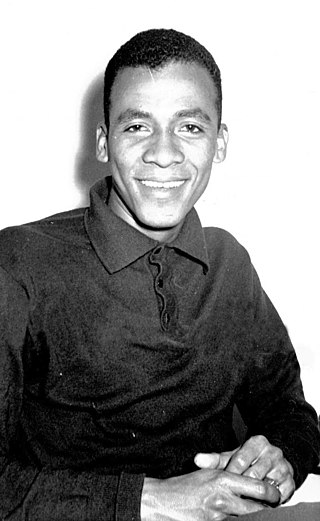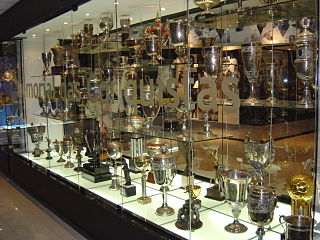
The CONMEBOL Libertadores, also known as the Copa Libertadores de América, is an annual continental club football competition organized by CONMEBOL since 1960. It is the highest level of competition in South American club football. The tournament is named after the Libertadores, the leaders of the Latin American wars of independence, so a literal translation of its former name into English is "Americas' Liberators Cup".
The Intercontinental Cup, also known as the Toyota European/South American Cup for sponsorship reasons, from 1980 to 2004, was an international football competition endorsed by UEFA (Europe) and CONMEBOL, contested between representative clubs from these confederations, usually the winners of the UEFA Champions League and the South American Copa Libertadores. It ran from 1960 to 2004, when it was succeeded by the FIFA Club World Championship, although they both ran concurrently in 2000.
A super cup is a competition, usually but not exclusively in association football, which often forms the 'curtain raiser' to a season, and typically involves only two teams who have qualified through success in other competitions during the previous season.
The FIFA Club World Cup is an international men's association football competition organised by the Fédération Internationale de Football Association (FIFA), the sport's global governing body. The competition was first contested in 2000 as the FIFA Club World Championship. It was not held from 2001 to 2004 due to a combination of factors in the cancelled 2001 tournament, most importantly the collapse of FIFA's marketing partner International Sport and Leisure (ISL), but since 2005 it has been held every year. Views differ as to the cup's prestige: it struggles to attract interest in most of Europe, and is the object of heated debate in South America.
The Supercopa Libertadores, also known as the Supercopa Sudamericana, Supercopa Libertadores João Havelange, Supercopa João Havelange or simply Supercopa, was a football club competition contested annually between 1988 and 1997 by the past winners of the Copa Libertadores. The tournament is one of the many South American club competitions that have been organized by CONMEBOL.
The 2002 FIFA World Cup qualification competition was a series of tournaments organised by the six FIFA confederations. Each confederation — the AFC (Asia), CAF (Africa), CONCACAF, CONMEBOL, OFC (Oceania), and UEFA (Europe) — was allocated a certain number of the 32 places at the tournament. 199 teams entered the tournament qualification rounds, competing for 32 spots in the final tournament. South Korea and Japan, as the co-hosts, and France, as the defending champions, qualified automatically, leaving 29 spots open for competition.

Alberto Pedro Spencer Herrera was an Ecuadorian footballer who played as a forward, and is widely regarded as one of the best Ecuadorian men's footballers of all time. He is probably best known for his still-standing record for scoring the most goals in the Copa Libertadores, the premier club tournament in South America. He was elected the 20th best South American footballer of the 20th century in a poll by the IFFHS in 2004. He was known as "Cabeza Mágica".

The CONMEBOL–UEFA Cup of Champions, previously known officially as the European/South American Nations Cup and also called Artemio Franchi Cup, is an intercontinental football match organised by CONMEBOL and UEFA and contested by the winners of the Copa América and UEFA European Championship. Organised as an occasional one-off match, it is a national team equivalent to the defunct Intercontinental Cup between the club champions of Europe and South America. The competition was held twice, in 1985 and 1993, before being discontinued. It was relaunched in 2022, where it was branded as the Finalissima, after the signing of a memorandum of understanding between CONMEBOL and UEFA.
The Small World Cup was a football tournament held in Venezuela between 1952 and 1975. In most of the occasions, the competition was played by four participants from Europe and South America. In the first period, clubs from three countries would win the tournament: Spain, Brazil and Colombia. Six clubs have won the trophy in this period: Botafogo, Real Madrid, São Paulo, Millonarios, Corinthians, and Barcelona.

The Copa Libertadores is the most important international football club competition in South America. Throughout the history of the tournament, 25 teams from seven countries have won the competition. Its rich history has been saturated with many legendary matches, iconic players and exceptional teams; from Peñarol's historical consecration in 1960, to Coutinho and Pelé enchanting the world with Santos's magical football, down to Estudiantes's unlikely success at the end of the 1960s, and Club Atlético Independiente being brought to glory in the utmost manner.
This page details the records and statistics of the Copa Libertadores. The Copa Libertadores is an international premier club tournament played annually by the top football clubs of South America. It includes 3–5 teams from all ten CONMEBOL members plus Mexico, whose clubs are sometimes invited as guests to the tournament. It is now held from January to November and it consists of eight stages.
The 1960 Intercontinental Cup was the inaugural edition of the matchup between the reigning European football champion and the reigning South American football champion. The idea was born of discussions between Pierre Delauney, UEFA secretary and José Ramón de Freitas, CONMEBOL secretary.
The 1968 Intercontinental Supercup was the first edition of the Intercontinental Supercup, a matchup between the European and South American past winners of the Intercontinental Cup. The two-legged tie was contested between Italian club Internazionale and Brazilian club Santos. The first match-up between Internazionale and Santos ended with the Santásticos beating Inter 1–0 at Milan's San Siro. A second leg was programmed to be disputed but Inter rejected to participate any further. Santos were declared the winners.

Santos FC is a football club based in Santos, that competes in the Campeonato Paulista, São Paulo's state league, and the Campeonato Brasileiro Série B or B, Brazil's national league. The club was founded in 1912 by the initiative of three sports enthusiasts from Santos by the names of Raimundo Marques, Mário Ferraz de Campos, and Argemiro de Souza Júnior, and played its first friendly match on June 23, 1914. Initially Santos played against other local clubs in the city and state championships, but in 1959 the club became one of the founding members of the Taça Brasil, Brazil's first truly national league. Up until 2023, Santos was one of only five clubs never to have been relegated from the top level of Brazilian football, the others being São Paulo and Flamengo.

Boca Juniors is an Argentine professional football club based in Buenos Aires. The club first participated in a South American competition in 1919. The first international cup they took part in was the Copa Aldao in which they participated as champions of Argentina. The club competed in AFA/AUF cups from 1919 to 1946 and since entering the Copa Libertadores, in 1963, the club has competed in every CONMEBOL-organized competition, except the Copa CONMEBOL, Intercontinental Champions' Supercup, Suruga Bank Championship, Copa Merconorte, Copa Master de CONMEBOL and Copa Ganadores de Copa, most of them extinct.

The Under-20 Intercontinental Cup is a football match organised by CONMEBOL and UEFA. The match is contested by the winners of the South American and European youth club competitions, the U-20 Copa Libertadores and UEFA Youth League, respectively. Organised as an annual one-off match, it is a youth competition equivalent to the former Intercontinental Cup, which featured the senior club champions of Europe and South America. The competition was launched in 2022 as part of a renewed partnership between CONMEBOL and UEFA. Portuguese side Benfica won the first edition in 2022.







